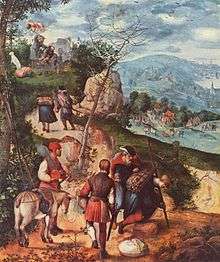Brunswick Monogrammist

The Brunswick Monogrammist was an anonymous Netherlandish painter, active in the mid-to-late 16th century. He (or she) painted religious scenes but also several scenes of secular merriment, including brothel and tavern scenes, and has been called "the most significant precursor of Pieter Bruegel the Elder".[1]
Identity
The monogram for which the Brunswick Monogrammist is named appears only once, on his (or her) Parable of the Great Supper in the Herzog Anton Ulrich Museum in Brunswick. It is composed of the interlocked letters J, V, A, M, S and L,[2] and neither it nor careful analysis of his work have yielded consensus about his identity. His (or her, as Verhulst was female) paintings have been attributed to a number of painters, including Jan van Hemessen, Mayken Verhulst[2] and Jan van Amstel.[3][4]

Partial list of works
- A Brothel Scene (New Haven, Yale University Art Gallery)[5]
- A Dispute in a Brothel (Sold in May 2007 at Christie's Amsterdam)
- St. John the Baptist Preaching in the Wilderness (Sold December 2005 at Christie's London)
- Ecce Homo (Amsterdam, Rijksmuseum)
- The Feeding of the Poor or Feeding of the Five Thousand or Parable of the Great Supper (Herzog Anton Ulrich-Mus.) [2]
- Itinerant Entertainers in a Brothel (London, National Gallery)
- Tavern Scene (Berlin, Staatliche Museen Preussischer Kulturbesitz)
- Road to Calvary
- Brothel scene, 1537, Gemäldegalerie, Berlin
See also
References
- ↑ Braunschweiger Monogrammist, Bordellszene, Städel Museum, Frankfurt am Main. Retrieved 4 September 2009
- 1 2 3 Elise L. Smith. "Brunswick Monogrammist" Grove Art Online. Oxford University Press, 12/4/07, http://www.groveart.com/
- ↑ Collection: Dr. Herbert & Monika Schaefer: Selected Works. New Haven: Mountain View Press. 1998. 32.
- ↑ Bloch, Vitale. "A Luteplayer by Jan van Hemessen" The Burlington Magazine, Vol. 98, No. 645. (Dec., 1956), pp. 445-447.
- ↑ Collection: Dr. Herbert & Monika Schaefer: Selected Works. New Haven: Mountain View Press. 1998.
External links
-
 Media related to Brunswick Monogrammist at Wikimedia Commons
Media related to Brunswick Monogrammist at Wikimedia Commons